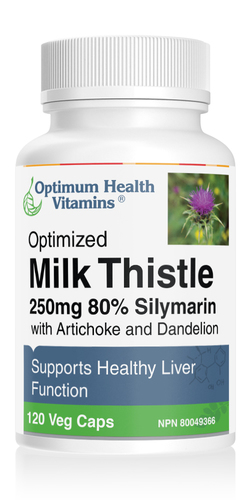-resized-600.jpg?width=640&name=milk_thistle_(41)-resized-600.jpg)
Of all the liver herbs and tonics available today, perhaps the best known is milk thistle, and rightfully so. Used for millennia as a general liver tonic, decades of research on milk thistle have shown it to be protective and regenerative for the liver in a broad range of situations including jaundice, cirrhosis, hepatitis, and fatty liver. Milk thistle can be extremely useful for shielding the liver from the deleterious effects of alcohol, drug and chemical toxicities (such as solvents, or acetaminophen), or for recovering from such damage. Milk thistle’s ability to protect liver cell integrity, also means it can exert a positive effect on liver enzyme levels in the blood. Due to its antioxidant properties, milk thistle can also protect other organs such as the kidneys and brain from chemical insult.
As a “cholagogue”, milk thistle helps the liver and gallbladder increase production and and flow of bile, thereby improving digestion and overall stomach and intestinal function. And according to Hoffman , it promotes lactation, (i.e. production and secretion of mother’s milk), is completely safe to use in this regard, and may also be of value for chronic uterine conditions.
-parts used: the seed
- known active constituents: a group of three flavolignans collectively referred to as Silymarin
-safety info: Aside from rare individual allergic reactions, no side-effects, established risks, or drug interactions have been documented for milk thistle. Though due to its ability to improve liver detoxification, users should be aware that it may result in faster drug clearance. Also, in addition to its hepatoprotective effects, those undergoing chemotherapy or radiation should be aware of its antioxidant properties.
-typical dosage: Milk thistle is listed by the German E Commission monograph for daily use at 200-400mg of silymarin, (i.e. one to two 250mg capsules standardized to 80% silymarin), though up to 3 of these capsules can easily be taken if specific protective or restorative effects are being sought.
COMMENTS: For years, we have used milk thistle extract in combination with other liver supportive herbs and supplements such as NAC, Alpha Lipoic Acid, Schizandra, and Selenium, (found in our Opti Liv Extra), or recently with Dandelion and Artichoke in our more basic Optimized Milk Thistle product.
 When we formulated, it was for many of the reason’s listed in the summary above, and especially for Milk Thistle’s (and also the others’) ability to raise levels of glutathione, and super oxide dismutase. These provide many antioxidant and antiaging effects in the liver and elsewhere in the body. As a side note: all of these properties can be a boon for those who do, or know they are likely to, overindulge in alcohol to lessen/avoid the effects the next day. (In those cases it’s best to consume the supplements prior to beginning drinking). Yet an additional effect we have seen has been the positive effects on women’s hormones…not a big surprise given the liver’s responsibility to process and metabolize them all.
When we formulated, it was for many of the reason’s listed in the summary above, and especially for Milk Thistle’s (and also the others’) ability to raise levels of glutathione, and super oxide dismutase. These provide many antioxidant and antiaging effects in the liver and elsewhere in the body. As a side note: all of these properties can be a boon for those who do, or know they are likely to, overindulge in alcohol to lessen/avoid the effects the next day. (In those cases it’s best to consume the supplements prior to beginning drinking). Yet an additional effect we have seen has been the positive effects on women’s hormones…not a big surprise given the liver’s responsibility to process and metabolize them all.
In my experience with Milk Thistle of over two decades, I have observed overwhelmingly positive results in all kinds of people, especially on gastrointestinal complaints. After all, like many of you have heard me say, “the gut and liver are glued together…what affects one affects the other”. Given environmental pollution levels, it is a safe bet that virtually all of us can benefit by supporting our livers with aids like Milk Thistle
Be well,
John

Sources:
1. Hoffmann, D. 2003: Medical Herbalism: The Science and Practice of Herbal Medicine; Healing Arts Press; Vermont, USA. pp. 177-178
2. Foster, S. 2009, Milk Thistle Monograph.
3. Willard, T. 1993: Textbook of Modern Herbology; 2nd Revised Edition; Wild Rose College of Natural Healing; Calgary, Can. pp. 317
Disclaimer: The above information is provided for informational purposes only and is not intended to replace the advice of your physician.

